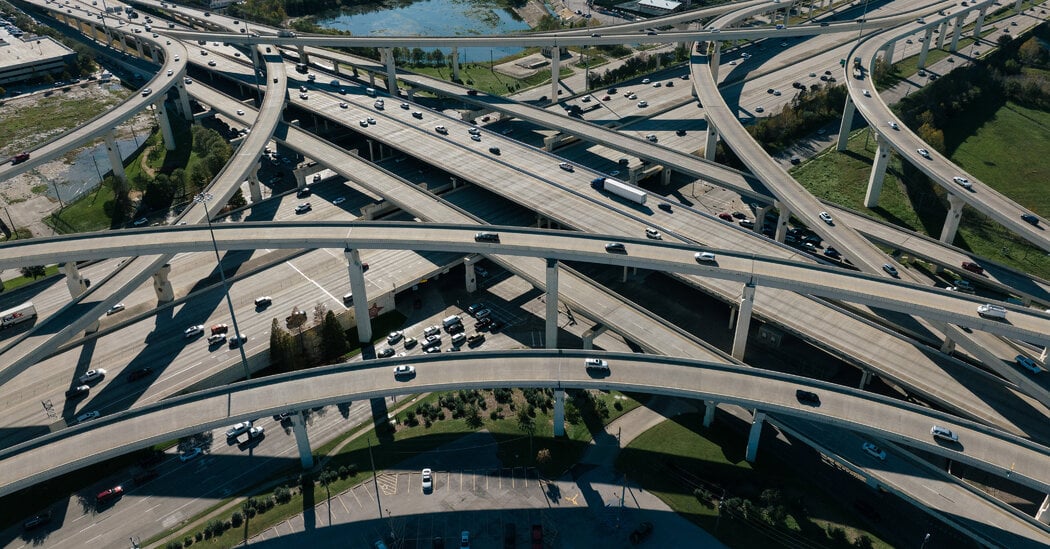- cross-posted to:
- fuckcars@lemmy.world
- cross-posted to:
- fuckcars@lemmy.world
For critics of widening projects, the prime example of induced demand is the Katy Freeway in Houston, one of the widest highways in the world with 26 lanes.
Immediately after Katy’s last expansion, in 2008, the project was hailed as a success. But within five years, peak hour travel times on the freeway were longer than before the expansion.
Matt Turner, an economics professor at Brown University and co-author of the 2009 study on congestion, said adding lanes is a fine solution if the goal is to get more cars on the road. But most highway expansion projects, including those in progress in Texas, cite reducing traffic as a primary goal.
“If you keep adding lanes because you want to reduce traffic congestion, you have to be really determined not to learn from history,” Dr. Turner said.



I thought it was common knowledge of the only way to reduce traffic is to reduce demand on roads, eg more expensive gas and tolls etc.
If you add another lane to the highway you’re just gonna attract more people and make it worse.
deleted by creator
I agree. In addition to impacting the poor in towns and cities, raising gas prices also has an even larger impact on people in more rural areas where everything is spread out. We do most of our grocery shopping in the next town over, which is 15 miles away, with basically nothing in between. Sure it still takes only 15-20 minutes to get anywhere we want to go, but those minutes are a lot more miles out here compared to driving 15-20 minutes to go a shorter distance I’m a city.
Within towns and cities, infrastructure should be built for people first, not cars, so as to make it easier and more pleasant to navigate a city by foot, bike, or public transit. It drives me crazy how pedestrian hostile most towns are. I’d like to see the design paradigm flipped.
Reducing traffic by raising prices is a pretty piss-poor way to do so if the only alternative is walking or decrepit bus lines. There need to be other measures taken.
You mean by… Fixing the bus lines and adding more public transit?
Yep. But that has to be done first. The Houston metro has piss poor public transit. Honestly most of the south does.
The US is all about more lanes for cars and less public transportation. Congestion be damned. Because “SoCiaLiSm.”
Funny thing is that congestion is basically queuing for mobility services. And queuing is exactly what you get in communist systems where the state provides for you. So highways are socialism!
deleted by creator
#3 Americans are too selfish to zipper. The proper American solution is to install special traffic lights mounted with cameras that fine whoever does not zipper on the right time
Yeah, traffic congestion is a lot more complex than it seems. If you alleviate one bottleneck, you can create 15 more (because now more traffic flows through the “fixed” area, stressing everything else) where some of those new ones interact with each other in a way that slows traffic more than the original bottleneck did.
You need to consider the endpoints as well as the middle. If you make it easier for people to get to their destination and off the road, then traffic will improve. Problem is, destinations are all over the place, so even that can end up causing more congestion if it also enables higher throughput that other roads it feeds into can’t handle.
Mass transit experiences the same thing. Not to say that there’s no point in emphasizing it, just that it won’t get rid of the problem entirely.
deleted by creator
You can reduce traffic with more lanes, but not just willy nilly. They need to be carefully planned and managed while limiting lane changes.
But a lot of the time, they won’t. The issue usually comes from people wanting to change lanes while others are merging on. In high traffic areas, lane changes will slow the traffic down while increasing the risk of an accident. Making alternatives such as different routes, other modes of transportation, or reducing the need for traveling usually work better in cities.
By that logic just make driving illegal, problem solved!
Something is left out of the equation because more lanes != more traffic, yet there is ALWAYS someone around saying otherwise. Go drive on the highways in Montana if you don’t believe me.